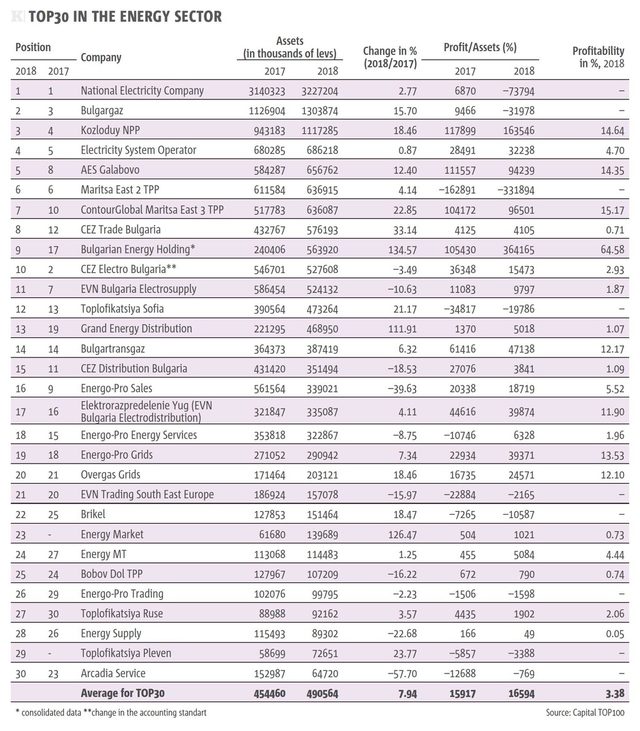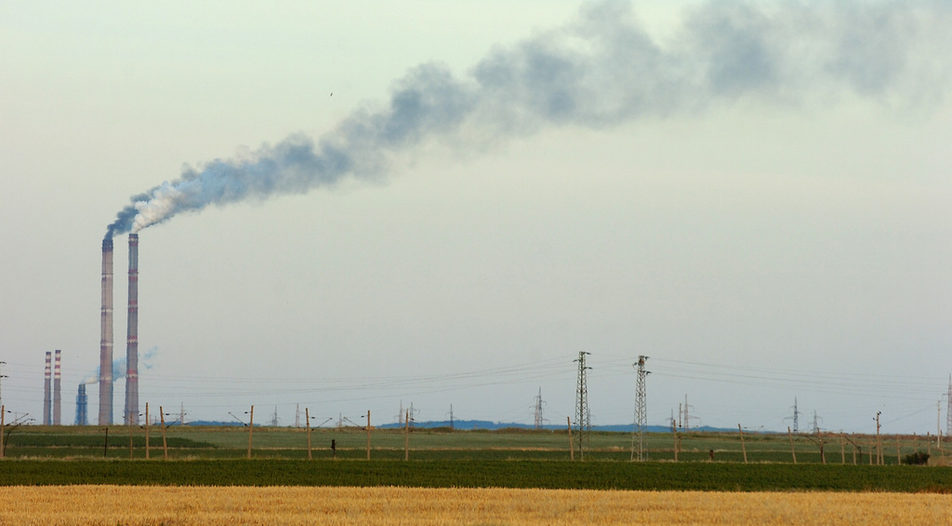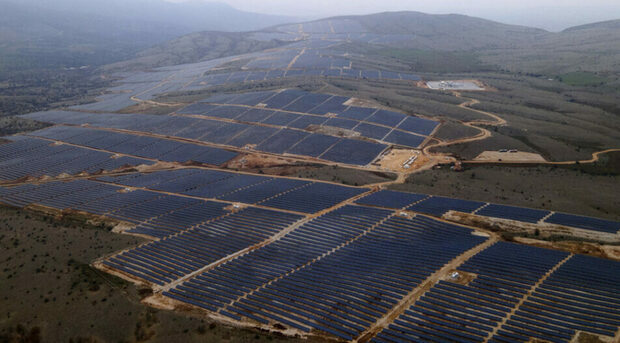- The electricity business became more market-oriented but two state-owned companies - NEK and Maritsa East 2 TPP - have deeply ingrained flaws
- Energy supply companies earned less due to accounting adjustments and decreased consumption
- The financial results of the state-owned gas companies deteriorated because of a lawsuit
The Top 30 energy companies earned over 14.7 billion levs in 2018. Compared to 2017, they increased their revenue by 8% or over 1 billion levs. The result would have been even more impressive were it not for changes in accounting standards that wiped out hundreds of millions from the books of energy distribution companies. There was also an increase, albeit smaller, in profits which reached a total of nearly 500 million levs.
The growth in revenue occurred against the backdrop of rising prices for electricity and other utilities. The global drop in natural gas prices hardly had any effect in Bulgaria, where a long-term delivery contract with Gazprom is in place. Furthermore, the earnings of the companies in the sector are affected by the increased volume of freely traded energy, which brought about improved results for some companies and bankruptcy for others. Last year was also marked by increasingly restrictive EU policies regarding coal that can no longer be ironed out by the local regulator.
These processes will intensify in the second half of 2019 when all producers with 1 to 4-megawatt capacity will be obliged to sell their products on the energy exchange. Additionally, the administrative obstacles to electricity export were removed and created another reason for the local price hike. The natural gas exchange market is expected to open by the end of the year, which together with alternative supply will entirely transform this so far completely regulated segment of the energy sector.
Kovachki's explosion
No fewer than five of the companies in the Top 30 have links to Hristo Kovachki. Over the past fifteen years, the businessman has acquired insolvent state-owned power plants and mines. These have survived despite failing to comply with ecological or labour standards. This is simply down to supervising government agencies turning a blind eye. For comparison, there are seven state-owned companies in the ranking, including the Bulgarian Energy Holding (BEH). This definitely cements Kovachki's position as the leading player in the sector, especially considering that a number of smaller companies gravitate around him. The arresting statistic here is that the five companies in question have increased their joint revenue by an unthinkable 42% and jumped from 626 million to 892 million levs.
The largest company in Kovachki's orbit is the electricity distributor Grand Energy Distribution, accounting for slightly over half the total revenue. Next came the Brikel and Bobov Dol power plants with 151 million and 107 million levs respectively. The other two companies are the central heating systems of Ruse and Pleven.
Regardless, the group still operated at a loss of over 6 million levs. Significantly, a large portion of the revenue stems from deals between these same companies - the electricity from the power plants is purchased by the distributor, which then provides CO2 quotas, while the coal comes from Kovachki's mines.
NEK reported losses again
The National Electricity Company - the 2018 revenue leader - reported a 73.8 million lev loss; this compared to a profit of 6.8 million levs the year before. Prior to 2017, NEK last operated at a profit in 2011. The current negative result came in spite of the company generating 175 million levs from the sale of electricity on the open market and its power plants producing 60% more electricity. Accumulated losses now amount to 1.21 billion levs, while the company's current liabilities exceed its current assets by a staggering 848 million levs, or 285 million levs more than at the end of 2017. The overall debt remained at over 4 billion levs, more than half of it owed to parent company BEH.
This demonstrates that, notwithstanding the ampler scope of the support mechanisms, the health of the state-operated energy monopolist is deteriorating. One key factor in the losses is lost lawsuits totalling 67 million levs, the most significant of which was the arbitration with engineering company Worley Parsons for 54 million levs over the discontinuation of the Belene nuclear plant project. Aside from these unforeseeable events, the company is inherently doomed to operate at a loss because it sells electricity cheaper on the regulated market than it buys from producers. In one case from 2018, the price established by the energy regulator was 71.71 levs per MWh, while the real cost of purchasing the energy was 179.24 levs per MWh. The difference is supposed to be covered by the Fund for the Security of the Electricity System, which in 2018 consisted of 1.35 billion levs. This, however, seems to have been insufficient.
Another adverse effect was the increase of the CO2 emission quotas - a more than threefold jump in the past year alone, from 6-7 euros to more than 22. The power plants that hold long-term contracts like AES Galabovo and ContourGlobal Maritsa East 3 TPP purchase the CO2 quotas they need and bill them to NEK, which also increases the average price of purchased electricity.
TPP beyond bankruptcy
The state-owned Maritsa East 2 TPP, which is the largest coal power plant in the country, is literally bankrupt. The company increased its revenue slightly in 2018. As paradoxical as it may sound, more work means more losses. These reached 332 million levs in 2018, likely to be a record for a non-financial company in Bulgarian corporate history. The reason is the plant's sky-high CO2 emission costs that increase in line with output. In last year's case, 363.3 million represented 57% of the total earnings of 636 million levs. Even though they already are impressive, the CO2 quota payments will keep increasing.
The accumulated losses now amount to 605 million and total debt is over 864 million levs - mostly owed to connected individuals. Just like with NEK, the current liabilities far exceed the assets - in this case by 909 million levs.
In an attempt to save the plant, BEH is preparing a procedure that will raise the company's capital, but that is likely to have only a temporary effect. It is indicative that, because of its costly electricity, the plant will for the first time in its history not work for the regulated market that supplies households, but will instead only rely on those periods when market prices cover its production costs. This will mean a significant drop in revenue and unless it is accompanied by layoffs, another colossal loss will ensue.
Government transfusions
The situation with the Kozloduy Nuclear plant is entirely different. The facility reported a record net profit of 163.5 million levs, thanks to higher electricity prices and the plant expanding its presence on the open market at the expense of the regulated one, where only 16% of its production was realized. More business on the open market also increased revenue by 20% and for the first time, the plant crossed the 1 billion thresholds.
The nuclear plant's good financial health allows it to perform the required maintenance program meant to extend the life of its reactors and indirectly permits the continued existence of Maritsa East 2. The Kozloduy NPP paid out an additional 220 million levs to BEH in dividends on top of the 56.6 million (half of the 2018 profit) mandated by law, which the energy holding then used to purchase CO2 quotas for the coal plant. Pouring money from one state-owned company to another is generally not allowed by the European Commission and this is the reason BEH listed the payments as debt repayment and is now seeking permission from Brussels to transform it into capital.
In addition to the payment from the nuclear plant, BEH also took a 110 million lev dividend from the Electricity System Operator (ESO). In spite of these added costs, the nuclear plant was left with nearly 240 million levs and ESO with 323 million.
The fading strength of energy supply companies
For yet another year CEZ's, EVN's and Energo Pro's supply companies have reported revenue drops. The negative tendency is due to the decreased volume of energy that was sold to clients at regulated prices and the growing share of business in the open market. Furthermore, there was an overall decrease in electricity consumption to the tune of almost 3%.
The most drastic revenue drop was reported by Energo Pro Sales - no less than 39.6%, which took earnings down to 339 million from the previous year's 561 million levs. There is a concrete explanation - the new accounting standards that came into effect on January 1st 2018. For this same reason, CEZ Electro Bulgaria recalculated the data from 2017. Otherwise, the drop would have surpassed 50%. After the adjustment, the real decrease remained at 3.5%. EVN Bulgaria's revenue fell by 10%.
Central heating operators grow with difficulty
For the first time, three central heating companies (Sofia, Ruse and Pleven) found a place in the energy Top 30 after their revenues increased. The policy of the Energy and Water Regulatory Commission in the past several years has been to keep heating prices low at the expense of the produced electricity since the former are paid directly by the customers of the local heating company and their fluctuations bring social unrest, while the latter is distributed between all electricity users.
It is precise because of electricity production that Central Heating Ruse and Central Heating Pleven, which are both linked to Hristo Kovachki, are part of the ranking. The activity accounted for 50% to 78% of their earnings and subsequently covered the losses incurred from heating distribution.
In this context, the financial health of Central Heating Sofia continues to decline for yet another year and even though its earnings increased by over 80 million levs (21%) the company still lost 19.8 million levs.
What about natural gas?
The two state-operated companies Bulgartransgaz and Bulgargaz reported increased earnings for 2018 in spite of a drop in consumption and transit. The significant ascent of natural gas production explains this - nearly 30% during the year and over 35% against the 2017 average.
Simultaneously, financial results worsened. The profits of the transit operator Bulgartransgaz dropped by 20% to about 47 million levs, while the supplier Bulgargaz reported an actual loss of nearly 32 million levs. This result was not caused by market performance but by the 150 million lev fine the EC handed the two companies and BEH for cartel practices. Each of the three companies recorded a 50 million lev provision.
The private operator Overgaz also reported a significant revenue surge and surpassed the 200 million lev mark. The company increased its profits by 47% and reached 24.5 million levs.

- The electricity business became more market-oriented but two state-owned companies - NEK and Maritsa East 2 TPP - have deeply ingrained flaws
- Energy supply companies earned less due to accounting adjustments and decreased consumption
- The financial results of the state-owned gas companies deteriorated because of a lawsuit
The Top 30 energy companies earned over 14.7 billion levs in 2018. Compared to 2017, they increased their revenue by 8% or over 1 billion levs. The result would have been even more impressive were it not for changes in accounting standards that wiped out hundreds of millions from the books of energy distribution companies. There was also an increase, albeit smaller, in profits which reached a total of nearly 500 million levs.












